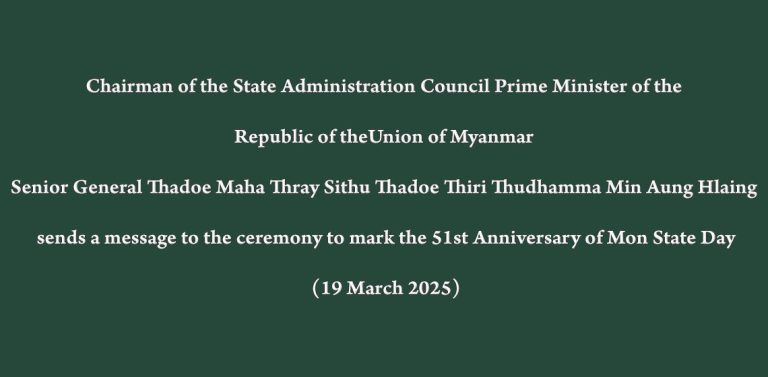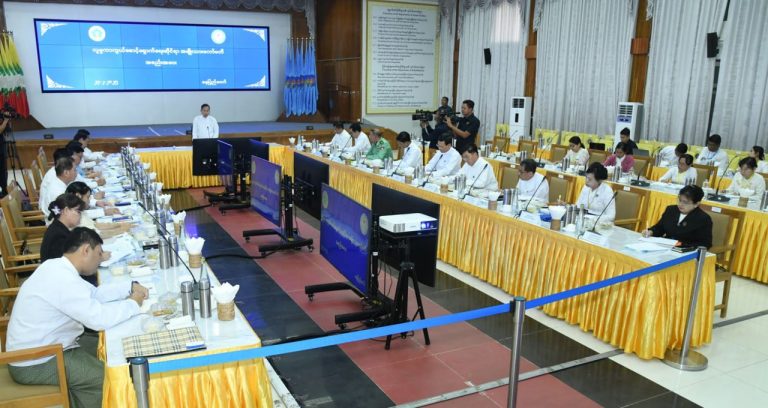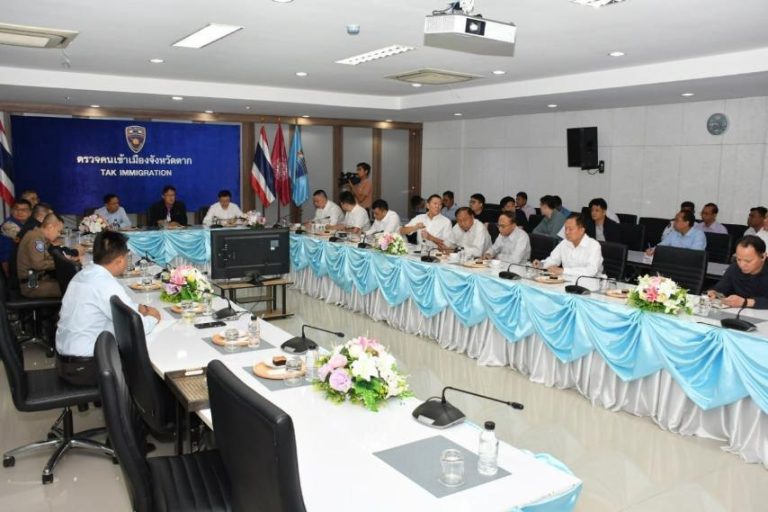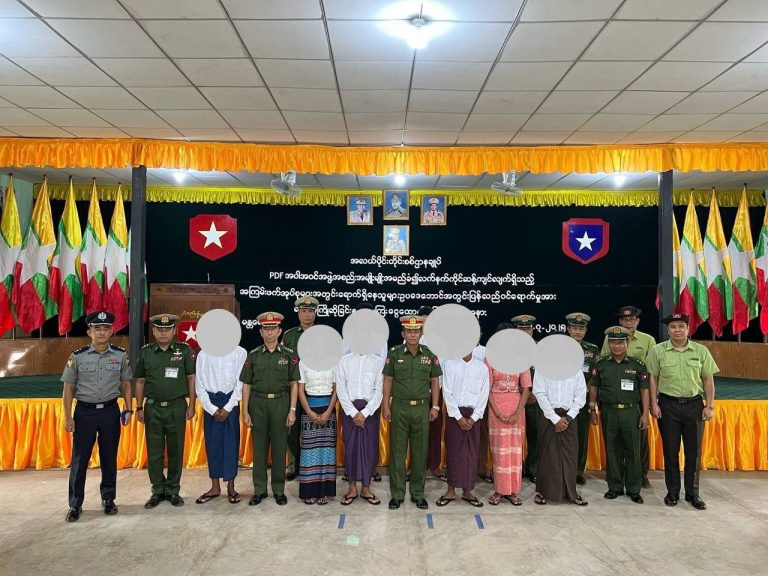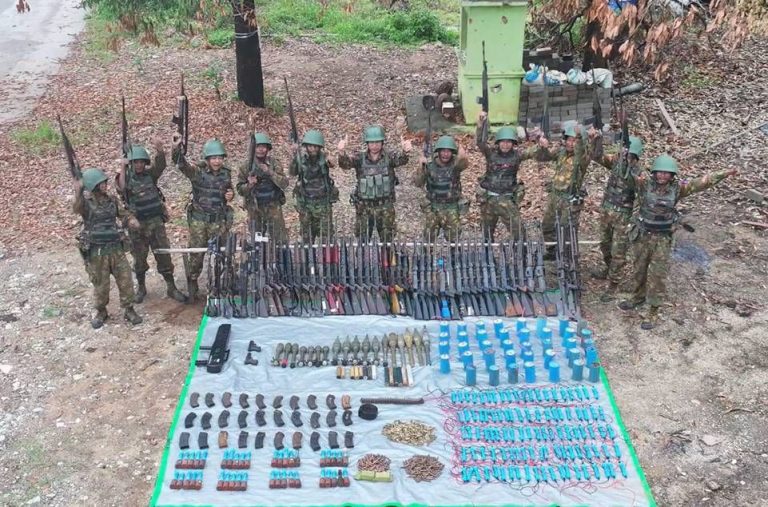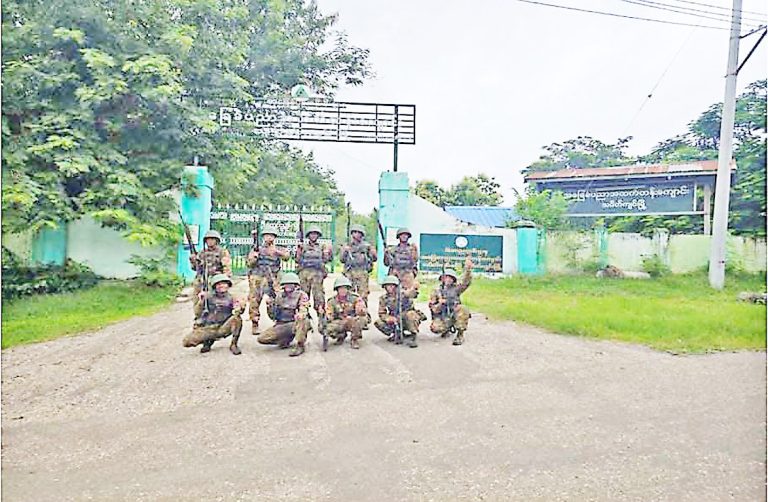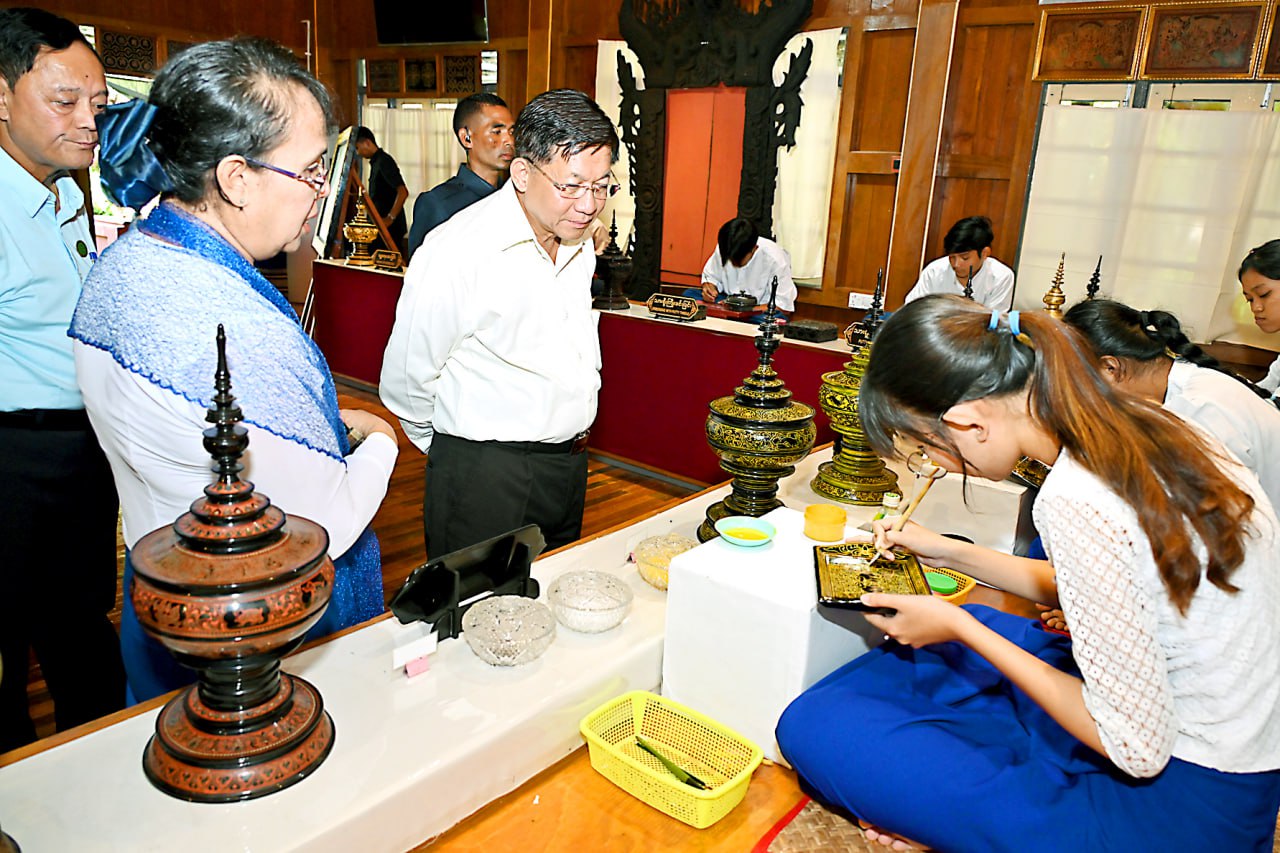
16 September 2024
Chairman of State Administration Council Prime Minister Senior General Min Aung Hlaing, accompanied by the entourage, Mandalay Region and Magway Region chief ministers, and officials, met departmental officials of NyaungU District, Mandalay Region, at Bagan Cultural Museum, Bagan Archaeological Zone this afternoon and discussed regional development.
Points and activities of NyaungU District explained
Chairman of NyaungU District Management Committee District Commissioner U Saw Tun Win reported on development activities in the district, departmentwise functions, land use, rain fall and river water pumping, seasonal crops cultivation, cultivation of cooking oil crops in the special zones, local rice and cooking oil sufficiency, livestock breeding, loans disbursed by the national economic development funds and repayment, existing dams, programs for drinking water sufficiency, industrial production, local and foreign tourists arrivals, public healthcare, opening basic education schools and libraries, upgrading of roads, water inflow at lakes in the zone, heavy rains that hit some of the ancient buildings.
U Myo Aung of Mandalay Region Government explained efforts to hit the oil crop target in the district, perennial crop cultivation, breeding activities, activities for education development and improving school pass rates, development of MSMEs through the use of local goods.
Discussions of union ministers Union ministers
Union ministers Lt-Gen Tun Tun Naung, U Tin Oo Lwin, U Hla Moe and U Myo Thant discussed water availability in the district, restoration of ancient lakes, road improvement in Bagan NyaungU area and systematic erection of road signs to meet the required features, conservation of pagodas in the zone. Development Affairs Minister of the region government explained greening and cleaning of NyaungU Township, systematization of pedestrian lanes.
In response, the Senior General said drains should be dug alone the newly built roads for proper water flow. Rains caused silting on public road due to the absence of drains.
As lessons were taken from the previous year’s cyclone Mocha, proper drainage systems could be installed and lakes could be restored and the result is that NyaungU District was not hit hard by the heavy rains that poured in various parts of the country and triggered floods.
Likewise road signs must be erected in accord with the directives.
Region development discussed
The Senior General then discussed regional development undertakings. Heads of department and staff responsible for the relevant areas should systematically strive for the successive of their assigned
duties. They must precisely realize the policies, orders and directives of the nation. They must constantly learn to have adequate knowledge of their functions and should take responsibility and accountability for the actions.
Statistics show that NyaungU District has a population of over 500,000. Of them students account for only 17 percent, so the figure is low. As only 12.88 percent of students reach high school education, the pass rate is also low. The district needs education promotion campaigns.
In accord with the slogan “discipline begins at school” students are mostly under the teachings of their teachers and have to abide by the school discipline. Hence there is difference in following the discipline between high school students and primary students.
All school age children should complete KG+9 level without fail. In the age of IT and AI that is witnessing global knowledge development;
every person should have middle school education.
Saff responsible for education promotion in the district must launch awareness and guidance campaigns. Only the educated will have the high thinking power and rationality.
Regional education improvement
In addition to the education promotion tasks, reading is also a requisite. The State is developing libraries and reading habit as a policy. Libraries can give academic and technologic knowledge to the persons whose ages are beyond school age. Opening of libraries at schools will improve the reading habit of children and broaden their knowledge. The work of improving education level amounts to shaping the future.
Departmental officials should prioritize the development of libraries and reading habits that is much supportive of the socioeconomic development of the relevant areas.
Agriculture Regarding agricultural activities in NyaungU District, reports indicate that there is still a need to meet the set targets.
If the crops we cultivate are to meet these targets, the region will see improved sustainability.
To increase yield rates and achieve the desired goals, it is necessary to obtain quality seeds.
Additionally, land preparation, including the application of fertilizers, should be adequately carried out. As for fertilization, composting with green manure is recommended, and biological fertilizers can also be obtained through systematic livestock operations. To ensure year-round agricultural activities, water can be supplied through river irrigation projects, which can be managed using solar-powered river lift systems. While the government is doing its best to provide the necessary support, farmers themselves must also take proactive measures, as the saying goes, “Wealth is earned by one’s own hands.” If the four basic principles of agriculture — seeds, soil, water, and methods — are systematically applied, the yield rates will improve, and farmers’ incomes will also increase. When local people have better incomes, local cash flow will improve, contributing to the overall economic development of the region.
Development of the tourism industry as an enduring asset of the region
Additionally, as NyaungU District has the inherent advantage of being a destination for both domestic and international tourists, the region can foster its development through tourism.
The heritage and cultural assets we possess, as well as natural beauty, can be promoted by providing convenient accommodation, food, and other services for visiting tourists. This will contribute to regional development.
As the visitors come, there is a need to maintain a beautiful and pleasant environment, lush landscapes, and upgrade the quality of local food products and lodging systems. For the stupas and pagodas, systematic management is required to ensure that pilgrims and visitors feel peaceful and comfortable during their visits.
Land management needs to be systematic
Concerning the management of uncultivated land, farmlands, and historical sites in the region, it is necessary to adhere to established rules, regulations, and laws. The land use plans should be prepared systematically, including the expansion of urban areas according to the town plan, which must be presented and implemented in accordance with the rules. Due to the presence of historical and cultural heritage sites in the Bagan-NyaungU region, special attention must be given to land management.
The improper use of agricultural land can harm the region’s sustainability, so systematic regulation is needed. All land in the area should be utilized effectively, with proper planning and implementation. The town plan must be carefully designed to incorporate religious structures, schools, administrative offices, and recreational areas, with due consideration for their integration. Additionally, efforts are underway to upgrade the NyaungU Airport to further enhance tourism in the Bagan-NyaungU region. Local authorities responsible for the region’s development should proactively plan for various contingencies to ensure that all conditions in the Bagan-NyaungU area continue to improve.
Lacquer Ware Technology College Subsequently, the Senior General and party visited the Lacquer Ware Technology College under the Department of Small Industries, the Ministry of Cooperatives and Rural Development to meet with teachers and staff. Union Minister for Cooperatives and Rural Development U Hla Moe first explained the primary responsibilities of the college, the vocational training courses offered, the recognition of the National Skills Standards Authority (NSSA) for the lacquer ware industry, the operations of libraries, dormitories, training rooms, the Lacquer Ware Museum, and lacquer ware shops.
Following this, the Prime Minister inquired about matters of interest. The principal of the college, Daw Nilar Myint, provided a briefing on the current state of lacquer ware education, the training conducted in foreign countries, and the teaching provided by foreign experts. She also discussed the emerging shortage of skilled Labour related to the lacquer ware industry and the development of the college.
The Senior General expressed the need to prevent the decline of lacquer ware-related skills and instructed that continuous efforts be made to ensure its sustainability. He also provided guidance on other necessary matters.
Afterwards, the Prime Minister, and party observed the practical activities in the Lacquer Ware Training Room, where trainees were working on a lacquer making process. The responsible officials provided explanations.
Next, in the museum, they toured various exhibition halls, including a special exhibit, a step-by-step display of lacquer ware production, an international lacquer ware display, and a showcase of household items.
They attentively viewed each exhibit and inquired about various aspects. After hearing explanations, the Senior General stressed that the lacquer and ceramic products produced in Myanmar were well-known and should be preserved and passed down to future generations. He also highlighted the need to support students adequately.
Finally, the Senior General signed the guest book at the college and presented awards to the teachers and students.
Then, they departed by helicopter from the Bagan ancient cultural region, inspecting the preservation of pagodas and stupas, the presence of water in ancient reservoirs, including Emerald Dam, the greening activities in the Bagan-NyaungU region, and the flourishing agricultural operations along the Bagan-NyaungU-Pyawbweregion.
Inspection of flooding incidents
They continued to monitor the flooding incidents caused by Typhoon Yagi in the South China Sea and the small cyclone in the central-west and northwest regions of the Bay of Bengal, which resulted in continuous heavy rain starting from September 10. The rising water levels in streams and rivers led to flooding in some townships within the Nay Pyi Taw Council area. Water flow from the Shan Plateau and surrounding hills caused landslides and mudslides.
The torrents from the hills and mountains merged with the Mone, Nawin, and Kintha streams, creating powerful currents along the Hsinthay creek, leading to the formation of large flood paths. After the water receded, sediment and debris remained, causing extensive damage to farmland and flooding in nearby villages.
The Senior General and party conducted a detailed inspection from a helicopter and directed officials on the necessary recovery efforts and disaster prevention measures.

